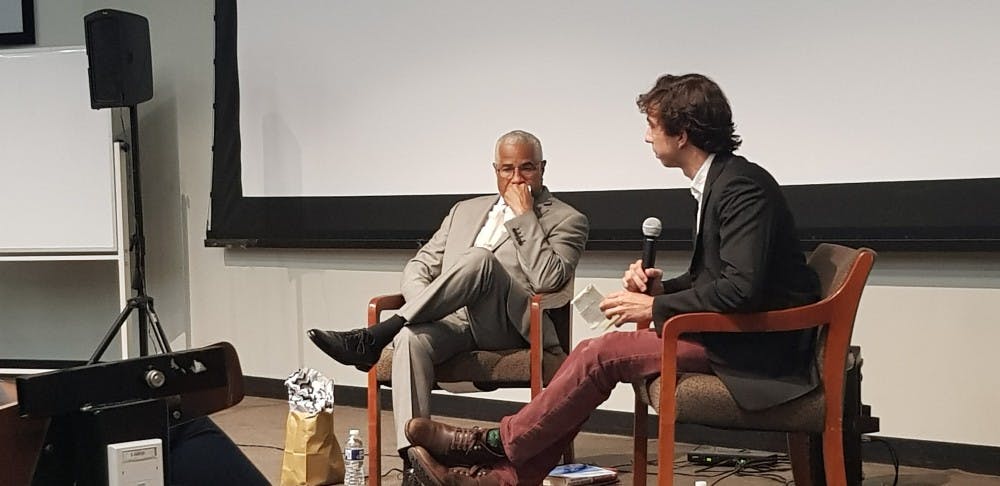The Office of Multicultural Affairs (OMA) hosted Felipe Luciano for their Heritage365 speaker series on Friday. Over a wide-ranging talk, Luciano focused on the importance of developing relationships between the Latinx and African American communities.
Known for his work in activism and journalism, Luciano was a founding member of the New York Young Lords, a civil rights organization.
In his lecture, Luciano expressed a desire to renew the solidarities that he remembers from his youth.
“We have to begin to come together in a real way. In the 60s, blacks and Puerto Ricans were so together it was seamless.... We were one people. It is not just people of color, we were family,” he said.
Luciano criticized the exclusivity that certain communities have developed, singling out the tendency that exists in Latin American cultures to exclude anyone who cannot speak Spanish.
What matters most to him, he explained, was not being afraid to have pride.
“I would hope that at the end of this lecture, those of you who are here will renew their commitment to being who the hell you are,” Luciano said.
“You cannot change anything if you don’t feel confident in yourself,” Luciano said. “There are people out there who want you to feel that. They want you to feel inferior. They want you to think that you cannot win.”
Senior Nicole Garcia agreed with this idea, expressing how rare it is for her to see such a topic being championed.
“I was really taken aback almost by the speak of ethnic pride. I feel like... it’s something that I want to read more about and practice a little bit more in my life,” she said.
While encouraging his audience to embrace ethnic pride, Luciano still warned that doing so may not be costless.
“When you walk with dignity like an Inca, if you walk with dignity like Montezuma, people do not like it,” he said.
Luciano criticized the current administration’s treatment of minorities, referencing the shootings of young African Americans and the internment of Latinos at the border.
“They have little girls in those concentration camps that are menstruating and they are not giving them any sanitary pads. It’s disgusting what going on. This is fascism, pure and simple,” he said. “This is Nazi Germany all over again. And remember the credo of this administration is that if I give you a lie long enough you are going to believe it.”
The future of the country, Luciano argued, depends largely upon minority populations.
“Latinos and Black people will be running this country. The question is, ‘Can you handle it and will you reproduce the same kind of madness that’s been produced in this country?’ Because if you are going to exhibit the same kind of racism, the same kind of bullshit... then it is of no consequence,” Luciano said.
Besides intersectional relationships, Luciano described the importance of education as a crucial method for furthering civil rights.
He condemned the failure of the United States school system to teach authentic Latin American history.
“It’s not an easy task to fight against the school system, but the school system determines the mindset of these young people and it’s time for us to fight for authentic history in the school system,” Luciano said.
Throughout the talk, Luciano implored the next generation to make a decision on how they want to proceed in our society as time passes.
“What do you want to be? Who do you want to be? Do you want to assimilate? Do you just want to slide through? Or do you want to be a distinct positive ethnic force in this country?” Luciano asked the audience.
Junior Lucas Miranda-Martinez emphasized his primary takeaway from Luciano’s talk, which is the necessity of different racial groups acting in solidarity.
“The one theme that was most important was that different cultural groups, different ethnic groups, different racial groups need to get together and need to support each other,“ Miranda-Martinez said.
Miranda-Martinez also affirmed Luciano’s acclaim, especially for mainland Puerto Ricans, as a figure standing up for the civil rights of Puerto Ricans and other minority members of society.
“[Luciano] is very significant, specifically for mainland Puerto Ricans — Puerto Ricans living in the U.S. — because he is one of the founding fathers of the Young Lords, an organization that really pushed for civil rights for Puerto Ricans and other groups in New York City and greatly improved their lives, and now he’s continuing that legacy on,“ Miranda-Martinez said. “He is now in his 70s, but he still stands up. He’s still in the fight for civil rights and justice.”





